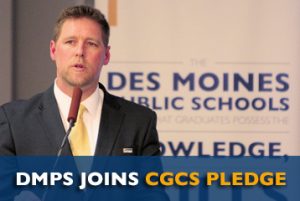DMPS Pledges to Improve Achievement of Young Men of Color
 Sixty of the nation’s largest public school districts, including Des Moines Public Schools, released a pledge to improve the academic and social outcomes of boys and young men of color. The pledge was announced today by the Council of the Great City Schools at a White House event with President Obama and attended by DMPS Superintendent Tom Ahart.
Sixty of the nation’s largest public school districts, including Des Moines Public Schools, released a pledge to improve the academic and social outcomes of boys and young men of color. The pledge was announced today by the Council of the Great City Schools at a White House event with President Obama and attended by DMPS Superintendent Tom Ahart.
In a call to action by the Council of the Great City Schools, of which DMPS is a member, each of the school systems support boosting efforts to prepare males of color for college and careers, to reduce the disproportionate number who drop out of school or who are suspended, and to help them succeed.
More than 40% of male DMPS students are African American or Hispanic
“While we may see fewer obstacles for male students of color than may exist in other cities, we are committed to seeing all of our students succeed,” Dr. Ahart said. “Our pledge is a statement to the community and the nation that we will come along side every student who needs our assistance.”
With roughly 32 percent of the nation’s school-age African American males and 39 percent of country’s school-age Hispanic males enrolled in large-city public schools, urban-school leaders agree that they have an obligation to teach all students to the highest academic standards and prepare them for today’s global society.
“Our job as urban educators is not to reflect or perpetuate the inequities that too many of our males of color face; our job is to eliminate those inequities—and that is what we pledge to do,” stressed Council Executive Director Michael Casserly. “We are pleased to join forces today with the White House, the U.S. Department of Education, and our other partners in an unprecedented shared commitment to improve the educational and social opportunities of our young men of color,” he added.
In “A Pledge by America’s Great City Schools,” each of the 60 urban school systems committed to carrying out 11 specific actions, which include:
- Ensuring that pre-school efforts better serve males of color and their academic and social development;
- Adopting and implementing elementary and middle school efforts to increase “the pipeline” of males of color who are on track to succeed in high school, and increasing the numbers participating in advanced placement, honors, and gifted and talented programs;
- Keeping data and establishing protocols to monitor the progress of males of color and intervene at the earliest warning signs of problems;
- Reducing the disproportionate number of males of color who are absent, suspended, expelled, or placed inappropriately in special education classes; and
- Working to transform high schools with low graduation rates among males of color and striving to increase the numbers of males of color and others who complete the FAFSA forms for college aid.
The Council is also announcing a partnership with the College Board to work jointly to increase the numbers of males of color participating and succeeding in Advanced Placement (AP) classes in our urban public schools.
In late 2010, the Council of the Great City Schools sounded an alarm with the release of an eye-opening report indicating that young black males in America are in a state of crisis.
The widely publicized report – A Call for Change: The Social and Educational Factors Contributing to the Outcomes of Black Males in Urban Schools – led to Council testimony before the U.S. Senate Subcommittee on Children and Families, and prompted the organization to release a companion analysis of Hispanic students.
The Call for Change study called for a White House initiative, noting that the education, social, and employment outcomes of African American males are equivalent to a “national catastrophe” requiring coordinated national attention.
Since the release of the reports, the Council established internal and external advisory committees to guide the urban school coalition on its work with males of color. It commissioned a series of papers by the nation’s leading authorities to propose strategies for improving urban school efforts on behalf of African American males. And in August 2012, the authors of the papers converged at a summit with the U.S. Department of Education and the White House to discuss strategies to improve outcomes for African American males.
The work of the authors has culminated in the development of a Council e-book titled A Call for Change: Providing Solutions for Black Male Achievement, which is available at no cost through Amazon and other outlets.
Other Council activities to improve the outcomes of males of color include:
- A national town hall meeting late last year on race, language, and culture, moderated by noted Harvard law professor Charles Ogletree, taped and televised on PBS
- A study titled Today’s Promise, Tomorrow’s Future: The Social and Educational Factors Contributing to the Outcomes of Hispanics in Urban Schools, as well as reports on English language learners; and
- Student and urban school-district surveys to gauge the challenges and possible interventions needed to improve the outcomes of males of color.




